Compost vs Fertilizer – What Are the Differences
When discussing compost vs fertilizer it can be confusing as fertilizer is an amendment that provides soil food in the form of nutrients and salts. Compost is therefore a natural fertilizer. The confusion stems from the fact that when the term fertilizer is used it is generally intended to refer to synthetic fertilizer. In this article, we will stick with this distinction.
The primary differences between compost vs fertilizer fall broadly into three categories; production, how each is produced; makeup, the physical and nutrient composition differences; and the environmental impact that they have in terms of production and application.
Compost is humus-rich organic waste material resulting from the decomposition of organic matter such as leaves, manure, and paper products while synthetic fertilizer is a manmade product that contains added nutrients for soil or plants.
Production The Difference Between Composts and Fertilizers
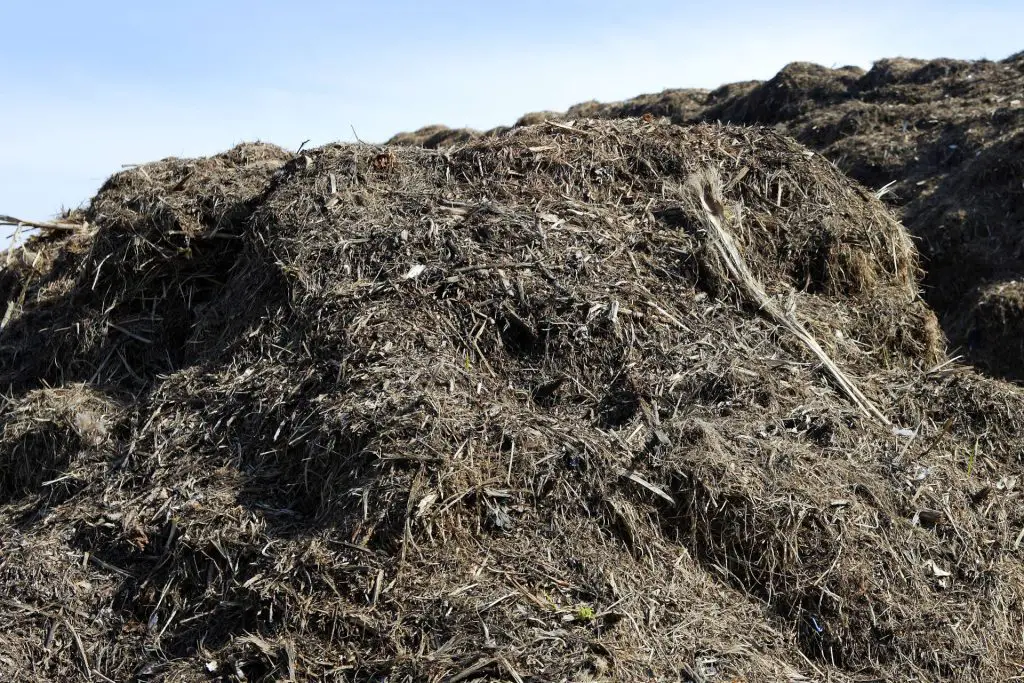
When looking at compost vs fertilizer and analyzing the disparities between the two, the first place to start is the production process of each material.
Compost is the end result of a decomposition process while fertilizer is a manmade product that comes from the chemical processing of materials such as oil, chemicals, and minerals. Compost has little nitrogen, fertilizer has medium levels of nitrogen and high levels of potassium, phosphorus, and other minerals needed for plants to grow.
Compost
Compost is created as a result of the decomposition of organic matter of grass clippings, other organic garden matter, food waste, and even cardboard and paper. Fertilizer refers specifically to a manmade product containing added nutrients for soil or plants.
The decomposition process producing finished compost can be :
- Aerobic, where beneficial microbes in traditional compost piles or industrial composting plants turn the organic material to humus
- Anaerobic, such as Bokashi or bucket composting which uses a fermentation process
- Vermicomposting, composting using worms whose worm casting provides nutrient-rich compost
In general, compost has little nitrogen content (compared with fertilizer), while fertilizer can be produced with varying nitrogen levels to suit its use case. It can be used both commercially or domestically to improve garden soil and is often employed during the planting season (spring)
Compost typically does not have pesticide residue, whereas fertilizer may contain pesticide residues at some levels depending on how it’s made and by whom it was manufactured (the manufacturer will specify if there are any).
Compost Manure
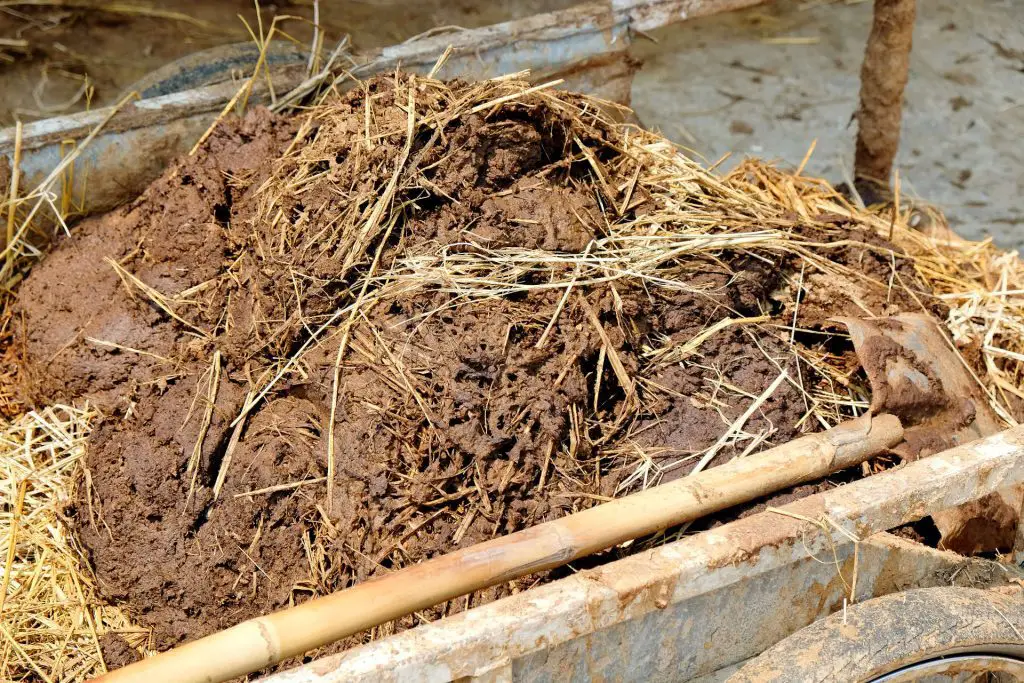
Compost manure is a product made from the decomposed waste of animals. It contains the nutrients that plants need to grow, such as nitrogen, phosphorus, and potassium.
Compost manure is produced from from animal waste, including chicken manure, pig manure, horse manure, and cow manure. The different types of animal waste can have different properties and different uses. With the exception of chicken and rabbit, most fresh manure requires curing to eradicate disease or pathogens that could be transferred to the human food chain.
The process of making compost manure involves collecting all the fresh manure that has been produced on your farm or ranch and then curing it so it can be used as fertilizer. The process of curing is done by allowing the animal waste to sit in an open airy area for several weeks or months until it becomes dry and crumbly. Once cured, it can be spread on your fields or gardens where it will fertilize your plants with nitrogen
Synthetic Fertilizers
When you think of fertilizer, the first thing that comes to mind is probably a bag or box of chemicals. In fact, most fertilizers are made from chemical compounds and sold as liquid or granular forms.
Fertilizer refers specifically to a manmade product containing added nutrients for soil or plants. The production of synthetic fertilizers involves mining, manufacturing, and transporting the raw materials. These fertilizers are made from natural gas or petroleum byproducts. They are then processed into a variety of forms through a series of chemical reactions to break down the raw materials into fertilizer producing the main nutrients such as nitrogen, phosphorus, and potassium.
They are then processed into various chemical fertilizer products including single-source nitrogen (such as urea) or phosphorus fertilizers, triple superphosphate (TSP), diammonium phosphate (DAP), and ammonium sulfate.
Synthetic fertilizer is typically used in commercial farming operations because it’s considered more cost-effective than organic fertilizer sources such as compost. In the form of garden fertilizer, they are also extensively used by gardeners as soil amendments, especially in lawn care.
In the U.S., these fertilizers are regulated by the Environmental Protection Agency (EPA), which sets limits on what can be added to them and how much can be sold.
Physical Differences
When we are looking at the physical differences we need to look at both appearance and material makeup of both.
Appearance – Compost vs Fertilizer
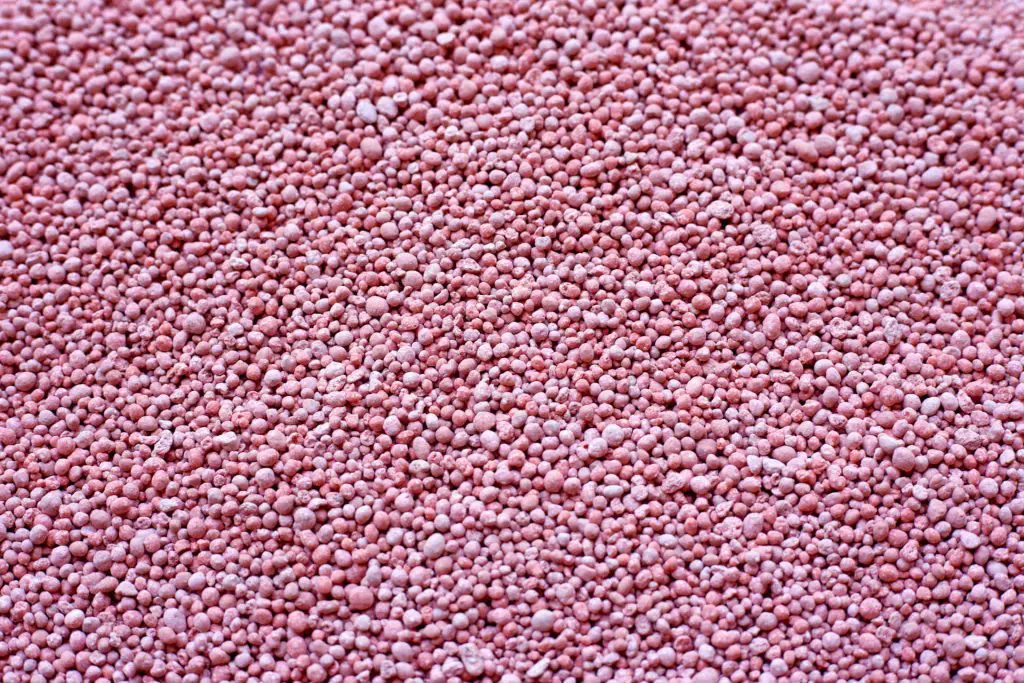
In terms of appearance, both can be in either solid or liquid form but that is where similarities stop.
In solid form, compost, being a natural product, is irregular in appearance, containing random size particles of decomposed material. It is dark brown in color and is often referred to as black gold.
Fertilizers can be a myriad of colors, which generally depend on the manufacturer’s preferences for distinguishing their various fertilizer products. The material itself appears as granules or sometimes small balls, usually two to three millimeters in diameter. It is produced this way for more even applications through drop or broadcast spreaders.
Nitrogen Levels
Compost has little nitrogen (5%), whereas synthetic fertilizer can be formulated to have various different levels of nitrogen.
Nitrogen is one of the three main nutrients that plants need to grow. It’s a key component of plant proteins and chlorophyll, which enables photosynthesis, the process by which plants convert sunlight into energy. Plants need nitrogen for this process, but they also need other nutrients like potassium and phosphorus as well. Compost doesn’t necessarily have the required amounts or balance of nutrients for specific tasks such as lawn seeding; fertilizers can be used to supplement compost’s nutrient deficiencies.
Pesticides, Pathogens, and Spores
Compost typically does not have pesticide residue, whereas fertilizer can have pesticide residue. Pesticides are harmful to human health and can be detrimental to the environment.
Being a natural product, compost, particularly homemade compost can be susceptible to pathogens and weed spores. ,
Soil Health and Conditioning
Compost helps in making arid soil more friable and maintains water retention properties of soil, whereas fertilizer supports the growth and quality of plants by providing essential nutrients to plants.
Soil Structure
Compost helps in making arid soil more friable and maintains water retention properties of soil, which can be particularly important if you have sandy soil, whereas fertilizer supports the growth and quality of plants by providing essential nutrients to plants.
Nutrient Levels
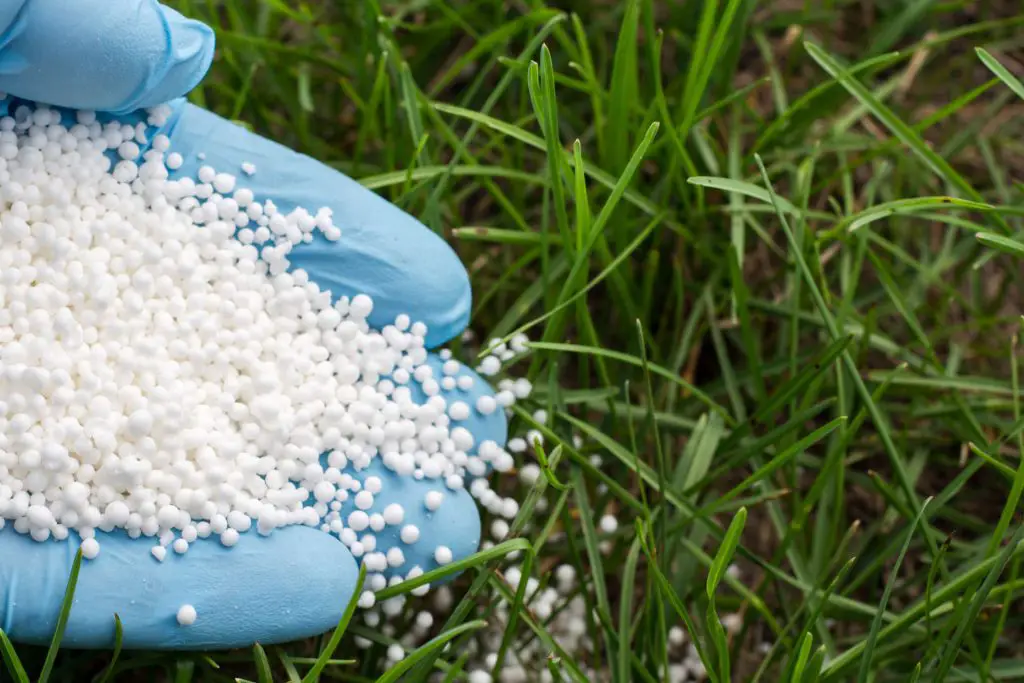
Both compost and fertilizer infuse soil with nutrients which in turn improves both plant growth, the ability of crops to thrive, and plant health.
Nitrogen is an essential plant nutrient for healthy plants. It also aids in releasing energy from photosynthesis during daylight hours, resulting in increased fruit or vegetable production. Compost usually has much less nitrogen (5%) than fertilizer.
There are numerous types of fertilizers, with many different formulations, with small or large amounts of nitrogen. They can be quick or slow-release fertilizers, the speed with which nutrients are released, with the choice of the type of fertilizer They can be formulated and can have small or large amounts of nitrogen and are formulated based upon the application it is intended for.
Fertilizers are often used on farms because of this flexibility. Generally, they contain concentrations of nitrogen compounds like ammonium nitrate at elevated levels along with other elements such as phosphates, etc., which can be used efficiently by plants because they can be more targeted than compost.
Source of Plant and Crop Nutrients
Plants need to absorb essential nutrients and salts through their roots and process them to help aid photosynthesis which produces leaves, stems then turn into flowers, fruit, and seeds
Fertilizer contains nutrients that plants need to grow: nitrogen (N) as we have discussed, phosphorus (P), potassium (K), calcium (Ca), magnesium (Mg), and sulfur (S). Plants also use other elements such as zinc & boron in their growth process – which can be added to the formulation of some commercial fertilizers.
In contrast, although compost contains nitrogen, phosphorus, and potassium, it only includes traces of other essential elements like calcium, magnesium, iron, and zinc.
The Differences in Environmental Impact – Compost vs Fertilizer
There are a number of environmental implications that you should evaluate when looking at the differences between compost vs fertilizer.
Compost
Compost is a natural fertilizer that can be made from organic materials. It’s also a great way to recycle waste and reduce landfill, especially if you compost your food scraps in the backyard.
Compost Manure
Compost Manure is produced by animals that eat grasses & grains – then excrete them in their waste. The main issue is methane emissions from the manure. Methane is a potent greenhouse gas that contributes greatly to global warming.
Synthetic Fertilizers
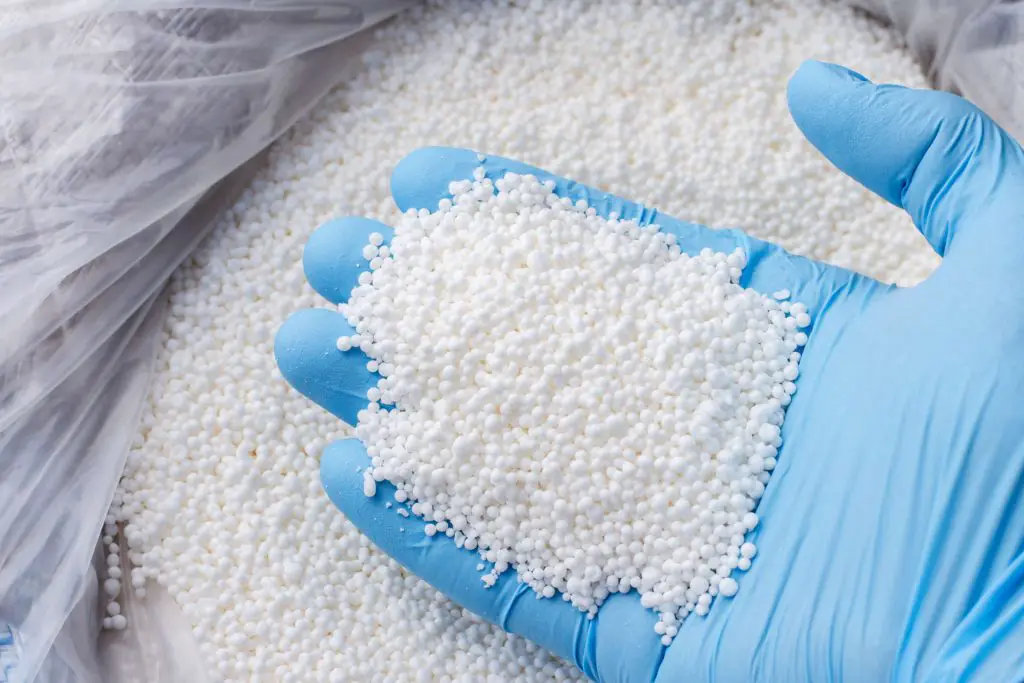
As synthetic product chemical fertilizers are made using petroleum products and contain high levels of nitrogen and phosphorus, they can impact the environment in both production and application. This can be harmful to plants and aquatic life if it runs off into bodies of water.
Synthetic fertilizer is a manmade product. The process of making these fertilizers produces large amounts of greenhouse gases that contribute to global warming. Synthetic chemical fertilizers also require large amounts of water to manufacture, transport, and apply to plants (about 10 times the amount required for compost). The higher levels of nitrogen and phosphorus can be harmful to plants and aquatic life if it runs off into streams or lakes.
The United States Department of Agriculture (USDA) estimates that about 10% of the nation’s total greenhouse gas emissions come from fertilizer production, packaging, and application.[1] with 59% of this through field emissions for food is produced using chemical fertilizer.[2] On a wider level over 40% of the world’s food production relies on chemical fertilizers.[3]
This means more pollution being produced than if you used organic materials such as compost and compost manure instead of fertilizer!
Pollution
The more we use compost than fertilizers, the less pollution we will produce!
Compost is a natural fertilizer that can be made from organic materials. It’s also a great way to recycle waste and reduce landfill, especially if you compost your food scraps in the backyard.
Fertilizer is manmade, meaning it has been added with nutrients like nitrogen and phosphate. This means more pollution is being produced than if you used compost instead of fertilizer!
Summary: Compost vs Fertilizer
Compost is a fertilizer, although one that has been produced through natural processes, replicating the soil’s nitrogen cycle. In common terminology, they tend to be differentiated between as organic or synthetic fertilizers. Organic fertilizers are produced naturally, through a process that mimics the nitrogen cycle in soil. Synthetic fertilizers are manmade and have been added with nutrients like nitrogen and phosphate. Generally, if you hear a gardener referring to fertilizer he is referring to synthetic chemical fertilizer.
Beyond the production differences, the main application difference between fertilizer and compost comes down to the control of the nutrients contained within the fertilizer. In organic fertilizers, the nutrient content is controlled by how much nitrogen-rich material is added to the garden soil. Synthetic fertilizers are typically manufactured in a laboratory setting and contain a specific amount of each nutrient they want to add to soil.
Finally, there are differences in the environmental impacts between the two. Organic fertilizers are generally better for the environment because they use less energy and leave fewer carbon footprints although this isn’t as clear cut as many imagine, particularly in terms of manure.
Notes:
- Sci Rep 12, 14490 (2022), Menegat, S., Ledo, A. & Tirado, R.: Greenhouse gas emissions from global production and use of nitrogen synthetic fertilizers in agriculture: https://doi.org/10.1038/s41598-022-18773-w
- Sci Rep 12, 14490 (2022), Menegat, S., Ledo, A. & Tirado, R.: Greenhouse gas emissions from global production and use of nitrogen synthetic fertilizers in agriculture: https://doi.org/10.1038/s41598-022-18773-w
- Our World in Data: How many people does synthetic fertilizer feed: https://ourworldindata.org/how-many-people-does-synthetic-fertilizer-feed
